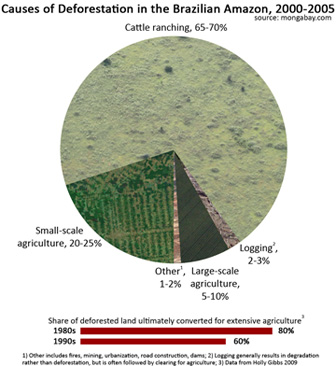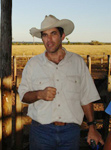Prominent leather buyers have developed a new traceability system to ensure that leather products from Brazil don’t result in deforestation, reports the National Wildlife Federation, an NGO working to improve the environmental performance of the cattle industry in the Amazon.
The Leather Working Group, a buyers group that includes Clarks International Ltd, New Balance Athletic Shoe Inc, Nike Inc, Puma, The Timberland Company, and other stakeholders, have now agreed to an environmental stewardship protocol that will “ultimately ensure that the origin of the materials within their supply chain is known and traceable back to the meat packing plant where the hides originated,” according to a statement from the group.

|
Under the terms of the protocol, meat packers must certify that all their direct suppliers have registered their farms — providing GPS coordinates of their holdings — by November 2010. Packers who fail to meet the criteria will be unable to sell leather to members of the Leather Working Group.
The initiative comes less than a year after a report from Greenpeace virtually shut down the cattle industry in the Brazilian Amazon. The report, Slaughtering the Amazon, linked cattle products used in top consumer brands to destruction of the Amazon rainforest. Beef and leather buyers shortly thereafter announced they would no longer buy cattle products unless the industry could prove it was cleaning up its act. By the end of 2009, Brazil’s largest slaughterhouses and beef traders had announced moratoria on deforestation.
Improving the traceability of beef and leather is significant because cattle ranching is the single largest driver of Amazon destruction: 80 percent of deforested land ends up as cattle pasture. Ranching is also Brazil’s largest source of greenhouse gas emissions.
Related articles
Brazilian cattle giants move toward zero deforestation in the Amazon
(04/07/2010) Brazilian cattle companies are making progress in their effort to map their supply-chains in the Amazon but are still falling short of their commitment to zero deforestation in the region, reports Greenpeace after a meeting at the Brazilian Association of Meat Exporters (ABIEC) in Sao Paulo.
Concerns over deforestation may drive new approach to cattle ranching in the Amazon

(09/08/2009) While you’re browsing the mall for running shoes, the Amazon rainforest is probably the farthest thing from your mind. Perhaps it shouldn’t be. The globalization of commodity supply chains has created links between consumer products and distant ecosystems like the Amazon. Shoes sold in downtown Manhattan may have been assembled in Vietnam using leather supplied from a Brazilian processor that subcontracted to a rancher in the Amazon. But while demand for these products is currently driving environmental degradation, this connection may also hold the key to slowing the destruction of Earth’s largest rainforest.
Brazil’s development bank to require beef-tracking system to avoid illegal Amazon deforestation
(07/01/2009) Responding to allegations that major Brazilian cattle producers are responsible for illegal forest clearing in the Amazon, Brazil’s development bank BNDES will soon require processors to trace the origin of beef back to the ranch where it was produced in order to qualify for loans, reports Brazil’s Agencia Estado. The traceability program aims to ensure that cattle products do not come from illegally deforested land.
Nike, Unilever, Burger King, IKEA may unwittingly contribute to Amazon destruction, says Greenpeace

(06/01/2009) Major international companies are unwittingly driving the deforestation of the Amazon rainforest through their purchases of leather, beef and other products supplied from the Brazil cattle industry, alleges a new report from Greenpeace. The report, Slaughtering the Amazon, is based on a three-year undercover investigation of the Brazilian cattle industry, which accounts for 80 percent of Amazon deforestation and roughly 14 percent of the world’s annual forest loss. Greenpeace found that Brazilian beef companies are important suppliers of raw materials used by leading global brands, including Adidas/Reebok, Nike, Carrefour, Eurostar, Unilever, Johnson & Johnson, Toyota, Honda, Gucci, Louis Vuitton, Prada, IKEA, Kraft, Tesco and Wal-Mart, among others.
Can cattle ranchers and soy farmers save the Amazon?

(06/06/2007) John Cain Carter, a Texas rancher who moved to the heart of the Amazon 11 years ago and founded what is perhaps the most innovative organization working in the Amazon, Alianca da Terra, believes the only way to save the Amazon is through the market. Carter says that by giving producers incentives to reduce their impact on the forest, the market can succeed where conservation efforts have failed. What is most remarkable about Alianca’s system is that it has the potential to be applied to any commodity anywhere in the world. That means palm oil in Borneo could be certified just as easily as sugar cane in Brazil or sheep in New Zealand. By addressing the supply chain, tracing agricultural products back to the specific fields where they were produced, the system offers perhaps the best market-based solution to combating deforestation. Combining these approaches with large-scale land conservation and scientific research offers what may be the best hope for saving the Amazon.







